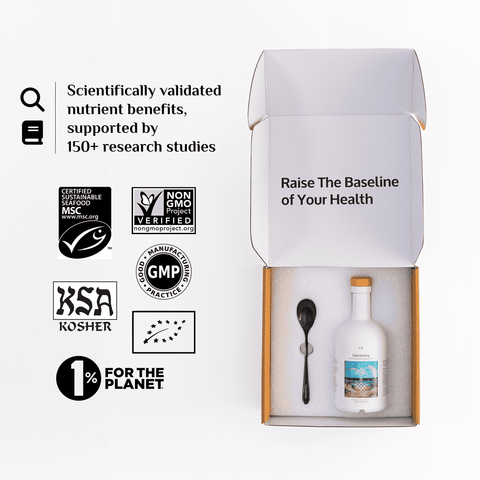- Why You Need Omega-3 Fatty Acids
- How Long Does It Take for Omega-3 to Work?
- Factors That Influence How Quickly Omega-3 Works
- How Much Omega-3 Should You Take?
- Maximizing Omega-3 Absorption: Best Practices
- When Should You Expect Specific Results?
- Final Thoughts: Patience and Consistency Are Key
- TL;DR Main Takeaways
Why You Need Omega-3 Fatty Acids
Omega-3 fatty acids—primarily EPA (eicosapentaenoic acid) and DHA (docosahexaenoic acid)—are essential for overall health. These healthy fats play a crucial role in:
- Heart Health: Supporting normal cardiovascular function and reducing the risk of heart disease.
- Brain Function: Enhancing cognitive performance and mood stabilization.
- Inflammation Reduction: Combatting inflammation and improving joint health.
Because your body cannot produce these fatty acids, you must obtain them through your diet or supplements. Deficiencies in omega-3 can lead to a variety of health issues, including brittle nails, dry skin, mood swings, and even an increased risk of heart disease.
How Long Does It Take for Omega-3 to Work?
Omega-3 supplements don’t provide immediate results. When you take omega-3 supplements, the fatty acids first enter your bloodstream before they are distributed to tissues like your heart, brain, and skin. Here's a breakdown of the process:
- Immediate Impact (3-4 Hours): Within a few hours of taking omega-3, tFhe fatty acids begin to circulate in your bloodstream.
- Cellular Saturation (24 Hours): After 24 hours, EPA and DHA begin to saturate red blood cell membranes, allowing them to travel to the organs that need them the most.
- Short-Term Benefits (4-6 Weeks): You may start to notice some improvements, such as enhanced mood or skin hydration, within a few weeks of consistent use.
- Full Impact (3-6 Months): For long-term benefits like improved heart and brain health, it can take up to 3-6 months for omega-3 to fully saturate tissues and provide sustained benefits.
Factors That Influence How Quickly Omega-3 Works
The time it takes to experience the effects of omega-3 can depend on several factors:
- Dosage and Concentration: Higher concentrations of EPA and DHA in your supplement will lead to quicker results. Make sure your supplement contains high levels of these fatty acids, ideally in triglyceride form for better absorption.
- Consistency: Regular supplementation is key. Taking omega-3 sporadically won’t lead to the same benefits as consistent daily intake.
- Overall Health and Diet: People with higher levels of inflammation or poor diets may take longer to notice the effects of omega-3 supplementation.
How Much Omega-3 Should You Take?
For general health, most health organizations recommend between 250-500 mg of combined EPA and DHA per day for a healthy adult. However, depending on your lifestyle and health needs, this amount can vary:
- Heart Health: Up to 1,000 mg of EPA and DHA per day is recommended for those with a history of heart disease or risk of heart attacks.
- Inflammation and Joint Health: Higher doses, 2,000-4,000 mg per day, may be beneficial for people suffering from inflammatory conditions like arthritis.
Always check the concentration of EPA and DHA on the supplement label, as different brands and forms of omega-3 (fish oil, krill oil, etc.) vary widely in potency.
Maximizing Omega-3 Absorption: Best Practices
- Take With a Fatty Meal: Omega-3 is fat-soluble, meaning it’s best absorbed when taken with a meal containing healthy fats (e.g., avocado, nuts, or fatty fish).
- Create a Routine: Consistency is key. Try to take your supplement at the same time every day to build a habit. Many people find it convenient to take omega-3 at dinner since it’s often the largest meal of the day.
- Reduce Omega-6 Intake: Omega-6 fatty acids, found in processed foods and vegetable oils, can counteract the benefits of omega-3. Reducing your omega-6 intake can help balance your body’s fatty acid ratio and improve omega-3 efficacy.
When Should You Expect Specific Results?
Different health conditions respond to omega-3 supplementation at different rates:
- Heart Health: For cardiovascular benefits, it may take 3-6 months of consistent supplementation.
- Skin and Hair: Improvements in skin hydration and hair texture may begin after 12 weeks. A study found that women who took omega-3 supplements experienced a 39% increase in skin hydration after three months.
- Mood and Cognition: Omega-3’s impact on mental health, such as reduced mood swings or improved focus, could take effect in as little as 4-6 weeks, depending on the individual.
Final Thoughts: Patience and Consistency Are Key
To fully experience the benefits of omega-3, you’ll need to be patient. It can take anywhere from 6 weeks to 6 months for omega-3 to have a noticeable effect on your body. However, with consistent intake, high-quality supplements, and a healthy lifestyle, you’ll be on your way to reaping the many benefits that omega-3 fatty acids have to offer.
TL;DR Main Takeaways:
- Omega-3 starts to work within hours but takes 4-6 weeks for noticeable effects, and up to 6 months for full benefits.
- Consistency is key—take your supplement daily and with a meal for best results.
- Adjust your dosage based on your health needs and check the EPA and DHA concentration in your supplements.









